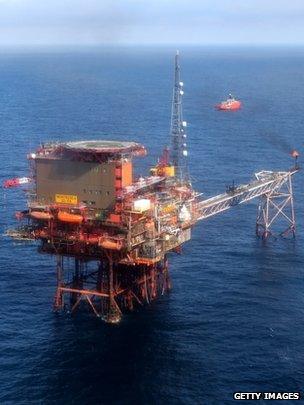The value of hydrocarbons
- Published

Few would doubt that North Sea oil has brought substantial advantages to Scotland, especially to those parts, such as Aberdeen, the North-east and Shetland, which have benefited most directly.
However, there is now a substantive debate about the longer term value of those hydrocarbons. Within that debate, time lines matter greatly.
Are we talking about the past? If so, then you will hear the argument from Nationalists that the wealth of the North Sea has been squandered.
You will find that perspective featuring in today's report from the Fiscal Commission, external established by the Scottish government.
You will see the estimate which suggests that, had a Scottish oil fund on Norwegian lines been established in the 1980s, then it could have been worth between £82bn and £116bn today.
Ask a politician who espouses the Union about that aspect - as we have done today - and you will be told it is irrelevant.
You will be told that what matters is the economic and fiscal challenge currently confronting Scotland.
Nationalists, of course, are more reluctant to sideline that historic analysis. But they too talk about the present and the future.
Scottish ministers say a Norwegian-style oil fund could only be fully introduced in Scotland once fiscal circumstances permitted. Once, in short, there was money available to fill such a fund.
Today we learned more. The Fiscal Commission suggests two funds: one, that Norway style long-term investment vehicle; two, a short-term mechanism to "buffer the budget from year on year variations in oil and gas tax revenues".
Aha, say those who support the Union. Volatility raises its head. This is the Swinney Cabinet leak writ large. This proves what we have said all along, that Scotland would be highly vulnerable to variations in the value of oil, much more vulnerable as a budget proportion than the UK as a whole.
No, says the author of that Cabinet paper, Swinney, J. It is eminent common sense to spread the gains from North Sea oil in the manner suggested.
Let us park that for a moment and consider the future. Let us consider the other fund, the long-term investment vehicle. Again, we learn more detail re timing today.
The commission notes that Scotland, like the UK as a whole, is in deficit.
Oil fund
Despite that, they argue that it makes sense to deploy a proportion of North Sea revenue to provide "a permanent income stream in the future" when, presumably, the oil is declining or dry.
They want such a fund established from "day one" post independence. This would, they argue, establish the principle of saving for the future.
But how to find the money for such a fund, given that deficit? The commission's answer is that the long-term aim would be for an independent Scotland "to run some form of onshore budget balance".
Which means restructuring Scotland's non-oil fiscal calculations by a combination of reductions in expenditure and/or increases in taxation. Which could be by around 2017-18.
Aha (again), say those who defend the Union. People in Scotland would have to pay more and get less in order to establish that oil fund.
However, the Commission (and Scottish Ministers) argue that it would not be necessary to await budget surplus in order to finance an oil fund.
This could be done as long as the deficit was "below the level of long-run economic growth" with debt on a downward trajectory.
At which point, enter a further - and familiar - argument about growth. Nationalists tend to project a growth bonus from independence, derived, they say, from economic policies tailored directly to Scotland's needs.
Their rivals tend to project precisely the opposite, arguing that the relatively small polity and economy of Scotland would be vulnerable to global and domestic pressures.
As ever, Scotland, your choice.